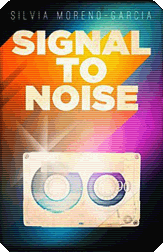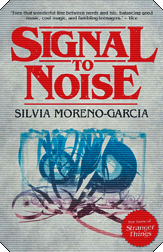Signal To Noise
by Silvia Moreno-Garcia
Reviewed by Galen Strickland
Posted January 31, 2016
Edits for new edition on September 19, 2022
Buy from Bookshop or Amazon. A purchase through our links may earn us a commission.
Originally published in February 2015, I read and reviewed Silvia Moreno-Garcia's debut novel almost a year later. It went out of print after a couple of years, but due to her more recent successes Solaris decided to reissue this in a new paperback, with some minor content edits. I'm making a few edits to this review myself, but mostly it is still my initial reaction. As many other books as I have and need to read, I frequently return to older ones that have pleased me, and this was my fourth reading. Yes, it's that good, in fact I have fallen in love with it even more each time. I have increased my rating at Goodreads from 4 to 5 stars, and would give it a higher score if allowed. Even if there had not been any changes to the text, my tired old eyes welcomed the larger print in the new edition. If you have yet to read Silvia, or only learned of her with Mexican Gothic or her latest, The Daughter of Doctor Moreau, you owe it to yourself to discover her beginnings. It is a debut novel, but it is as good as anything else she has written, strong in character development, realistic dialogue, superb at capturing mood and setting.
Signal To Noise is as much a coming-of-age tale as it is a fantasy about magic, but it succeeds at both. However, it is so good at the former that the latter element could be removed without harming the plot. Set in Mexico City in two different time periods, 1988/89 and 2009, it tells the story of Mercedes Vega, nicknamed Meche, along with her childhood friends Sebastián and Daniela, as well as the turbulent life of her parents. Meche is obsessed with music, a passion she inherited from her father, a frustrated musician and songwriter who had to settle for being a radio DJ. It is remarkable that she established such a staunch friendship with Sebastián, who cared little for music, his passion being books. When they first met she noticed he had a book of Poe's Tales of Mystery and Imagination, so she hoped he would help her understand the album of that name by the Alan Parsons Project. The 2009 scenes have Meche returning to Mexico City from her home in Norway for the funeral of her father, whom she had not seen in twenty years. Each chapter switches back and forth between the two time periods, so we learn of Meche's later alienation from her family and friends before we read of the reasons why.
Thomas Wolfe once declared "You can't go home again," but most of us realize that is only true to a certain extent. Wolfe meant that you and home will have changed in the intervening years, it's almost as if a different person is experiencing it, the only continuity being memory. This is the author's first novel, and although also the first of her work I read, I expected the fantasy element to be stronger, maybe verging toward horror, since a lot of her earlier short stories seem to be in that genre. Meche had grown up hearing stories of magic from her grandmother, convinced that it was real. But how could she manifest it? Perhaps if her grandmother had been more forthcoming Meche would have been able to control it more. As it is, she learns each person who wants to cast a spell must have an object of power, something that means a lot to them and speaks to their spirit. In Meche's case it was inevitable that object would be a record album. She had accepted the portability of a Walkman in her teens, and an iPod later, but preferred vinyl. She also realized a record conformed to the 'circle of power' of a witches coven, which she forms with her two friends to control elements of their life. Meche is also good at math, later becoming a computer programmer. She understood the relation of musical notes to mathematical notations, as well as how both conformed to the incantations of a magic spell.
As I said earlier, the fantasy element is only peripheral to the plot. Otherwise, it's very similar to any story of teenagers who feel like outsiders, not part of the 'in' crowd. A lot of us have experienced the same type of angst, feelings of being misunderstood, or not appreciated by parents or the 'cool' kids. Some of us have also had to experience family disintegration, either as children or adults. Meche is the main protagonist, but this is written in third person so we also get to know the internal struggles of other characters. I empathized most with Sebastián, probably because I'm also male and experienced a lot of what he had to endure. I came to care for Meche as well, even though she is not sympathetic. She's selfish and controlling, only concerned with her own needs and ignorant of (or unwilling to acknowledge) how her actions have hurt others. Her major fault was in not recognizing the thing she needed most when it had been staring her in the face for years. It is possible she finally realizes her mistakes, but is that enough for her to change for the better? Recommended for most, even if fantasy or magic is not your preference. The main thing is it's a compelling story with vivid and relatable characters. Plus lots of great music references. If this was a movie I would expect an end credit sequence telling us what happened to the characters later. For Meche, I wonder if she was able to finish and publish the book on Latin American pop music her father had worked on for years.
Update: Signal to Noise won the Copper Cylinder Award from votes by the members of the Sunburst Society of Canada, not to be confused with the juried Sunburst Award, for which it was a finalist. It was also nominated for three others: British Fantasy (Best Fantasy Novel); Locus (Best 1st Novel); Aurora (Canada, Best Novel).
 |
 |
Since vinyl albums figure into so much of the plot, I at first thought it odd that both earlier paperback printings featured a cassette tape as the cover image. However, the first time Meche believes she has magical powers, whether she did or not or if it was just coincidence, she thinks she succeeds in cursing one of her nemeses into an accident when she flips the cassette in her Walkman as she passes him on the stairwell at school. Her first visualization of harming him had come to her the night before, as she listened to her father's vinyl album of The Door's debut. As Jim Morrison wailed "Break on Through" she pictured herself stomping on Teófilo's arm and breaking it. Lots of other musical references, including many Latin American artists I had never heard of, along with the more popular imports from the US and Europe. As she has with several other books, Silvia created a Spotify playlist for Signal To Noise. Listen to great music, read a great book. Immerse yourself into the chaotic lives of Mexican teenagers, whom you will discover are just like you and me, struggling to find their place in the world. And maybe finding it.
Related Links:
Silvia's Official Website
My other reviews of her books
We would appreciate your support for this site with your purchases from Amazon, Bookshop, and ReAnimusPress.